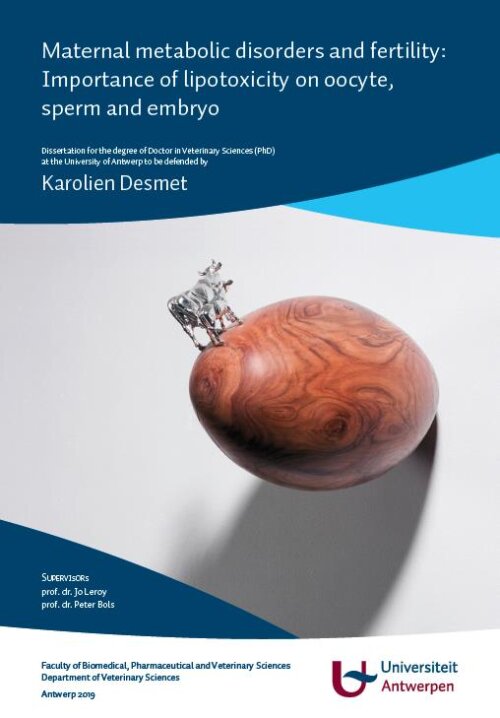Maternal metabolic disorders and fertility: importance of lipotoxicity on oocyte, sperm and embryo
Karolien Desmet, DVM, PhD
Date: 19th November 2019, at 5 PM
Location: Auditorium O8, Campus Drie Eiken

Abstract
Lipolysis-associated maternal metabolic disorders, like obesity and diabetes type II in women and negative energy balance in dairy cows, are a major risk factor for subfertility. These altered metabolic states are reflected in the follicular and oviductal micro-environment with emphasis on elevated concentrations of non-esterified fatty acids (NEFAs). Although information is available about the toxic effects of elevated NEFA concentrations on oocyte and embryo developmental competence, there remains a lack of information regarding the underlying mechanisms. In this dissertation, the bovine model was used to study the relation between lipolysis-linked maternal metabolic disorders and fertility.
We showed that elevated NEFA concentrations during either in vitro oocyte maturation or early embryo development impact the resultant blastocysts’ transcriptomic and epigenetic profiles. This disturbance in epigenetic reprogramming may render the embryo susceptible to changes during further development. We observed that good quality blastocysts produced from metabolically compromised oocytes have defective post-hatching development after embryo transfer to a recipient cow. These embryos were retarded in growth, exhibited disturbed metabolism and transcriptomic profile, and displayed a reduced capacity to signal its presence to the mother.
Also the oviductal environment plays a vital role in the functionality of and interaction between the oocyte and sperm cells. We showed that although sperm functionality was affected under lipolytic conditions, adequate numbers of viable sperm cells retained their fertilizing ability. In contrast, the fertilization process was affected as well as subsequent embryo development.
Metabolic disorders and sub-/infertility are both increasing in men and women. The combination of having both obese parents on fecundity has received minimal attention although most couples share lifestyle and thus obesity in both persons is more likely to occur. We investigated if metabolic conditions of couples seeking assisted reproductive services in an IVF-clinic could be linked to embryo quality and metabolism. Aberrations in follicular fluid, female and male waist circumference had an effect on embryo quality and metabolism. Combining BMI of both parents led to an association between parental BMI and embryo metabolism. Only male BMI was associated with pregnancy outcome.
We concluded that lipolytic conditions cause subfertility through impairment of oocyte maturation, fertilization and embryo development. We also substantiated an effect of the parents’ metabolic health on quality and metabolism of their embryos in a human setting. In characterizing these effects, we may increase the awareness of the importance of parental metabolic health in relation to fertility and carryover effects persisting in the offspring.